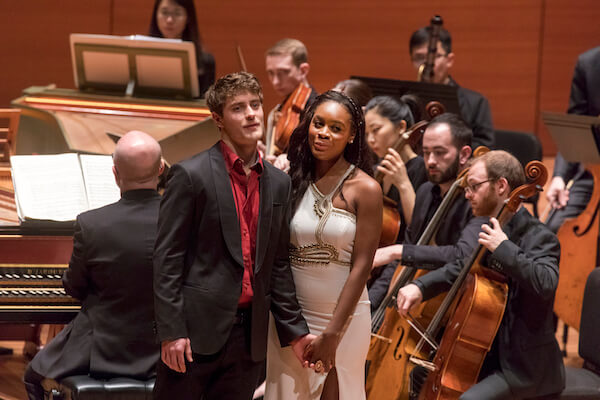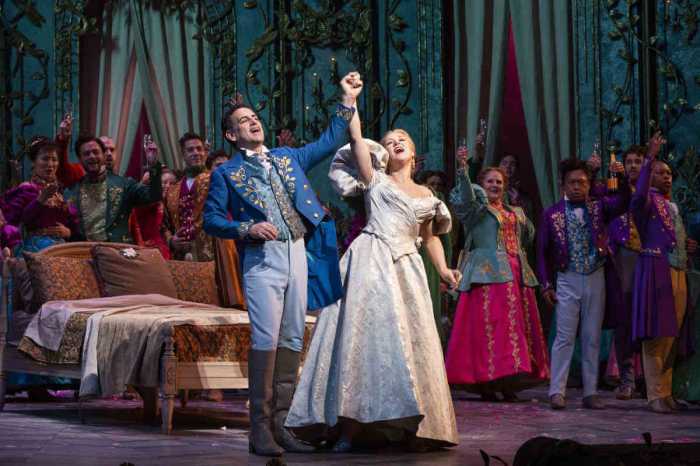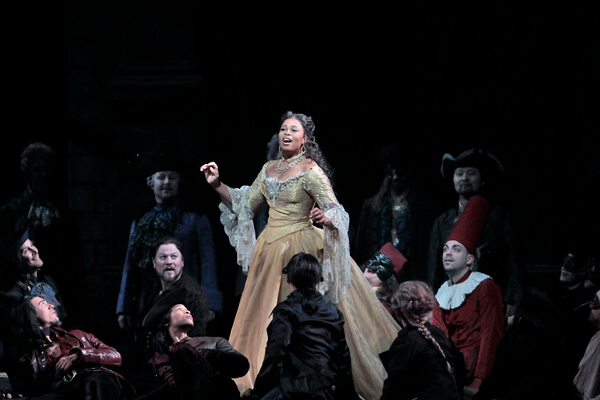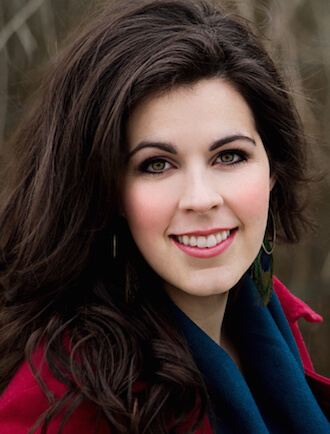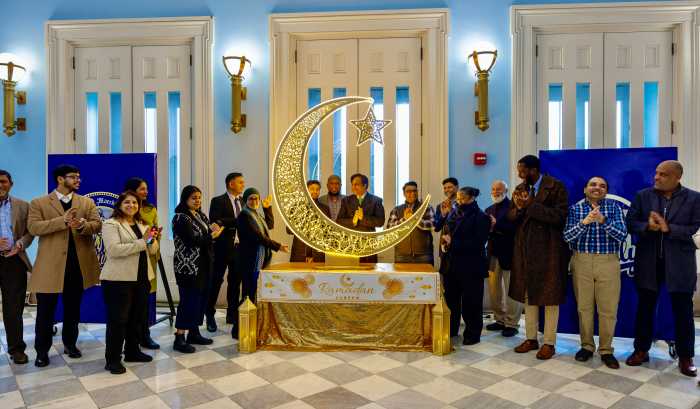Diana Damrau in Bellini’s “I Puritani” at the Metropolitan Opera. | MARTY SOHL/ METROPOLITAN OPERA
At 16, I saw the Met’s current production of “I puritani”, which the company revived with mixed success February 10. The staging (Sandro Sequi), sets (Ming Cho Lee), and costumes (Peter J. Hall) were in a deliberated antiquated style — scrims, drops, stand-and-sing chorus — beloved of the “muscle” behind the project, Joan Sutherland and her husband Richard Bonynge, who conducted that long-ago performance. Embalmed in 1976, four decades down the pike the whole thing has acquired no more animation.
Maurizio Benini’s prosaic conducting didn’t help. What made the evening worthwhile — beyond the enduring quality of Bellini’s music, especially in elegiac moments — was one performance, the Arturo of Mexican bel canto tenor Javier Camarena.
Among many ballyhooed recent vocal artists, Camarena is the real deal: a singer remarkable not due to his “charisma” or his “backstory” but due to the beauty of his voice and the artistry and evident pleasure with which he deploys it. The tone is warm and flowing, and he loved to dimenuendo it — almost but not quite to a fault. The music’s difficult phrasing seems uncannily natural. Every Camarena intervention in the evening stirred excitement and content.
Bellini and Handel at Lincoln Center
The final ensemble before the last-minute happy ending, the famous “Credeasi misera,” takes Arturo to a written high F in the second stanza. In Bellini’s day this would have been sung in falsetto; for modern tenors it’s nearly impossible to produce in live performance, though New York has heard it taken well by Gregory Kunde and Lawrence Brownlee, the excellent Arturo of the Met’s 2014 revival. Camarena probably could produce the note in a recording studio, but sensibly substituted a high D flat, as most tenors (including Pavarotti) have done. A woman in the high boxes who had regularly been screaming out (hardly justified) “Bravissima” after every fixed, pressured high note sung by Diana Damrau followed up the huge ovation that greeted Camarena’s thrilling performance of this (even without the F) nearly impossible passage by savagely bellowing, “No F!”. This introduced an ugly if authentic note of old school dementia (in Ethan Mordden’s sense) to this antiquated-when-birthed revival. What’s next, patrons berating Edgardos for not taking the as-written high E flat in the Act One “Lucia” duet?
Damrau had been ill and in fact had yielded the dress rehearsal to Eglise Gutierrez. Perhaps Gutierrez should have sung this “prima” as well, since — despite lavish ovations — Damrau’s Elvira was just not very well sung by her own standards. As at the start of her recent Juliette, the middle voice sounded stringy and the top often chancy, with tremolo and reduced breath control compromising the long Bellinian lines. At times, and at lower dynamics, she produced some truly beautiful tone. Any artist can be indisposed, and Damrau’s Elvira overall was not “bad” by any stretch — but neither was it adequate toward what a Met Elvira should sound like. Unfortunately, the elaborate ornamentation she chose in fact showcased her limitations and not her virtues.
In her favor, Damrau motivated every line of dialogue, in a way only Beverly Sills among the Elviras I have seen has bothered to do; on the other hand, as with her Juliette, this slim and attractive stage figure way overdid the manic caperings-about meant to suggest youthfulness. Twirling has become a “thing” on the opera stage: Damrau is its High Priestess.
Alexey Markov brought his virile Verdian sound to Riccardo Forth but — hard though he tried — not enough stylistic acumen or dynamic precision to make a real success of it beyond a solid opening aria. In the now discredited 1970s style, he dropped out of the cabaletta’s music several measures before the end to bellow a sustained high G. Dramatically, Markov essentially played the same “heavy” he presents as Di Luna in “Trovatore”; Riccardo is in fact a more nuanced and sensitive character. Markov is always good to hear; one often feels he could be a much better artist than he allows himself to be.
To my schoolboy ear, James Morris’ Giorgio did the best singing in the original outings of this production. Luca Pisaroni, though one of the Met’s — and indeed the world’s — best bass-baritones, simply sounded miscast, without the needed resonance on the bottom (Markov, in fact, outdid him in this respect, playing havoc with the needed balance) or the ease on top for the kind uncle’s music. Native Italian and sound musicianship were welcome, but not enough to rescue Pisaroni’s performance.
Virginie Verrez, recently out of Juilliard, made a good showing as a dark-hued, agile-voiced Enrichetta.
Jakub Jozef Orlinski and Onadek Winan in Handel's “Agrippina” presented by the Juilliard Singers and Juilliard415. | RICHARD TERMINE
The next night found Tully Hall joyously showcasing Juilliard415, the school’s wonderful baroque music initiative, in Handel’s early masterpiece “Agrippina.” The 1709 comedy — showing the characters from the later part of “I, Claudius” scheming for sex and power — holds the stage wonderfully, as Glimmerglass (2001), NYCO (2007), and Boston Lyric (2011) productions demonstrated. Let’s hope rumors that it’ll be the Met’s next Handel project materialize.
Here, specialist conductor Laurence Cummings had the playing consistently crisp and articulate, with solo instruments quite dazzling virtually throughout. As a longtime Handelian, I minded only that we heard so very many of the numbers — even some of the most fantastic arias — in only their initial “A” form, without either the contrast or varied repeat that the full sequence provides. Some trimming is needed; the audience would surely have happily heard more da capo sections.
The young cast was dramatically alert and engaged. The vocal standouts were Samantha Hankey, powerful and accurate in the title role and a fabulous vocal actress; the excellently agile and sonorous Handel bass Cody Quattlebaum (Claudio), and the rich-voiced mezzo Avery Amereau (Narciso), a voice in a million. Nicolette Mavroleon’s unconventionally produced but compelling voice lent color to Nerone. Onadek Winan (Poppea) looked sensational and sang with pleasant brightness; Louisa Proske, the director, had her consistently overdo the semi-parlando recits, a shtick approach funny only the first time.
Jakub Jozef Orlinski as Ottone stood out for projecting feeling and luminous tone. Clearly the industry wants this gifted, very handsome young man to be a star; he’s excellent in many ways but I’d be happier with more consistent adherence to pitch and a less covered approach to articulating words.
Celeste Montemarano’s supertitles proved unusually pithy and distinguished. In all, a joyous evening.
David Shengold (shengold@yahoo.com) writes about opera for many venues.

